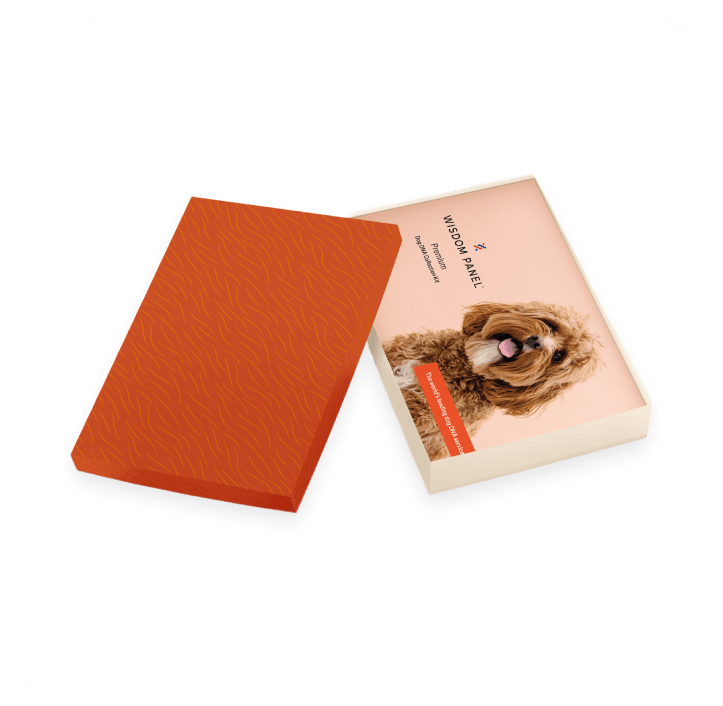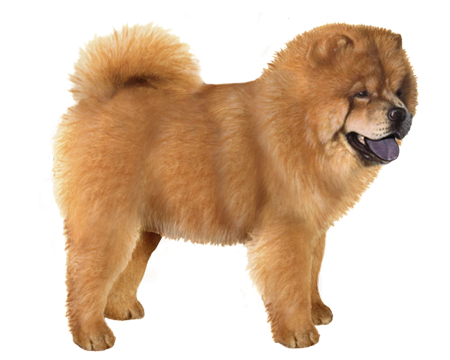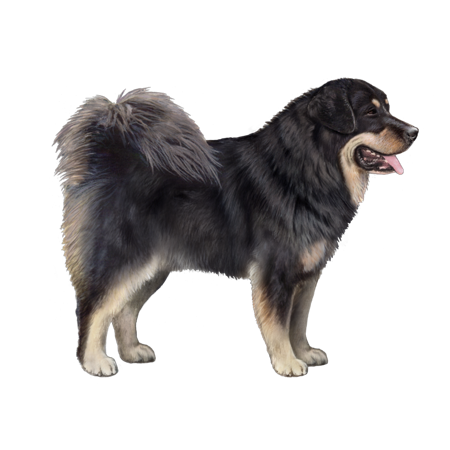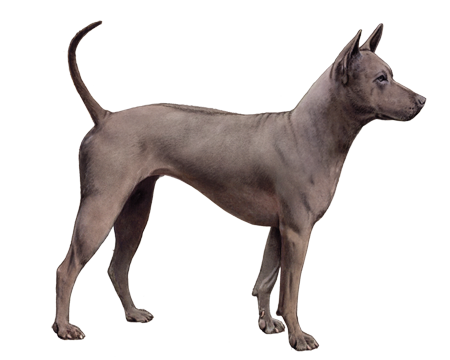
Kishu Ken
A hunting dog that originated in the mountainous region of Kishu, Japan, the Kishu Ken is an active and faithful companion. These pups are known for being calm and affectionate. But they retain their strong predatory instincts—which often kick in around small animals.
Interested in discovering if your dog is a Kishu Ken?
Check out Wisdom Panel's DNA tests.

Kishu Ken Traits
General Appearance
The Kishu Ken is a medium-sized dog with upright, pricked ears, a curled tail, and a narrow muzzle. It is a strong, muscular breed.
Coat and Coloring
The earliest Kishu Kens had white coats with various colored markings. But the newer breed standard introduced in 1934 allows for only a solid color: white, red, or sesame.
Like many Japanese hunting breeds, the Kishu Ken has a double-coat, with a soft and dense undercoat and coarse, straight outer coat. The hair on the dog's cheeks and tail is longer than that on other parts of the body.
Distinctive Physical Traits
Kishu Kens have triangular-shaped eyes that turn slightly upward at the outer corners.
Kishu Ken Temperament
The Kishu Ken is energetic, obedient, devoted, and good-natured. These dogs make excellent companions for those with active lifestyles. They'll happily tag along on hikes or hunting trips before curling up for a good rest. Kishu Kens are devoted to their packs and develop strong bonds with their people, but they may seem aloof around strangers.
Both affectionate and independent, Kishu Kens can be good with children. But their strong predatory instincts may make them unpredictable around other dogs and aggressive toward smaller animals. A strong-willed breed, Kishu Kens aren't the best option for inexperienced owners.


Kishu Ken History
Hailing from Japan, the Kishu Ken (also called Kumano Ken and Taichi Ke) likely descended from wolves and a mix of spitz-type hunting dogs. The breed is similar to the Hokkaido, Shikoku Ken, and Kai Ken.
Though the Kishu Ken is a medium-sized breed, these dogs have hunted larger prey—including wild boar and deer. Hunters favored the dogs with white coats because they were easier to spot in the woods. The Kishu Ken comes from ancient breeds. But the breed itself has been around for less than a century. Its strength and endurance made the Kishu Ken popular in Japan, where it's still among the most common breeds used for boar hunting. But these dogs are rare elsewhere.
Kishu Ken numbers remain small and have declined in recent years, making the breed's future uncertain. The Japanese declared the Kishu Ken a Memorial of Nature (protected species) in 1934.
Kishu Ken Care
Nutrition
Kishu Kens require a high-quality dog food that's age-appropriate—whether it's commercially manufactured or homemade (with a veterinarian's supervision and approval). A nutrient-dense food that helps this active breed maintain its weight may also be necessary.
Grooming
When it comes to grooming, Kishu Kens are low-maintenance. Regular brushing and an occasional bath will keep them looking their best. Their fast-growing nails will also need regular trims.
And keep in mind that dental care—including at-home teeth brushing—is essential to the overall health of all dogs, regardless of breed.
Exercise
Kishu Kens want to go, go, go. So they're best-suited for owners with very active lifestyles. Bred to run and hunt, Kishu Kens enjoy hiking, camping, swimming, and endurance activities—including flyball, rally, herding, and lure coursing. Daily walks will rarely be enough to burn off their intense energy. Since this breed can be reactive to other dogs, the dog park is not the best place to take a Kishu Ken for exercise.
Highly intelligent, Kishu Kens get bored easily. So, mix things up by exploring new trails, taking different routes around the neighborhood, and introducing fresh games and toys to keep them stimulated. Bored, under-exercised Kishu Kens often get into trouble or try to run away.
Training
Kishu Kens are calm, alert, and intelligent. As a result, they learn fast. But that doesn't mean the breed is easy to train. Strong hunting instincts can make it hard for Kishu Kens to focus on their owners instead of the environment.
Start training early and focus on developing a bond. Using a prized treat or toy as a reward will likely reduce this breed's resistance to training. And high-energy, active games will help you hold your Kishu Ken's attention.
A natural suspicion of strangers and unfamiliar dogs makes early socialization crucial for Kishu Kens, as it minimizes nervous or reactive behaviors.
Breed Group
Asian and Oceanian
The Asian and Oceanian group is comprised of breeds whose origins lie in Asia, which have spread as far as Australia, the islands of the Pacific, and the Arctic. This group is possibly the most ancient of all breed groups and were bred for a variety of purposes, including guarding, hunting, and as draft dogs.
Resources
https://www.akc.org/dog-breeds/kishu-ken/
http://www.kishuclub.com/history.html
http://www.fci.be/Nomenclature/Standards/318g05-en.pdf
Reviewed July 26, 2020 by Cindy Elston, DVM, MPH


























































